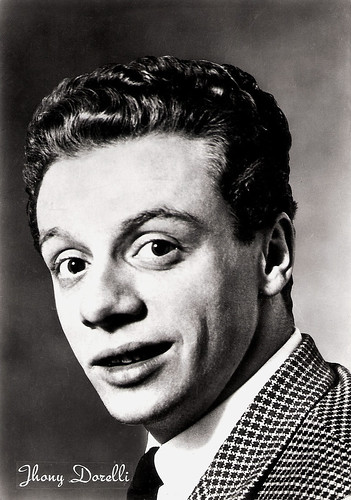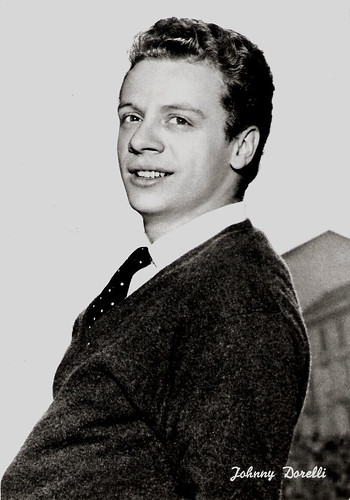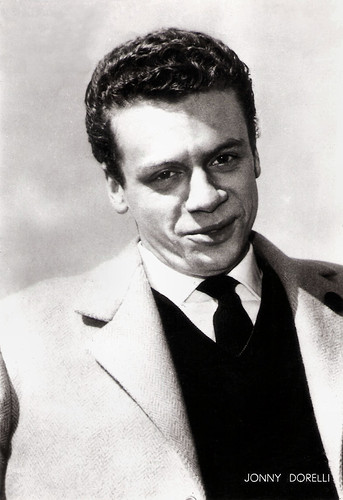
Italian postcard by Rotalfoto, no. 716.
Winning the Sanremo Festival
Dorelli was born Giorgio Guidi in 1937 in Meda, Italy. In 1946 he moved to New York with his family, where his father, Nino D'Aurelio (born Aurelio Guidi), found work as an opera singer.
Dorelli studied double bass and piano at the High School of Music and Art in New York. He returned to Italy in 1955. He debuted as a singer in the late 1950s for the CGD label. In 1958 he won the Sanremo Festival in duo with Domenico Modugno, with the songs 'Nel blu dipinto di blu' (aka 'Volare') and 'Piove' ('Ciao ciao bambina').
Dorelli's most famous songs are 'Calypso Melody' (1957), 'Julia' (1958), 'Boccuccia Di Rosa' (Pink Lips) (1958), 'Love In Portofino' (1959), 'Lettera A Pinocchio' (1959), 'Montecarlo' (1961), 'Speedy Gonzales' (1962), 'Era Settembre' (1964), 'Probabilmente' (1965), 'Al Buio Sto Sognando' (1966), and 'Solo Più Che Mai' (Strangers In The Night) (1966).
'L'immensità' earned Dorelli ninth place at the 1967 edition of the Sanremo Song Festival. Later, he had hits with 'Arriva La Bomba' (1967), 'E Penso A Te' (1971), and 'Aggiungi Un Posto A Tavola' (1975). As a (popular and jazz) crooner, he sang numerous songs in Italian and in English live on television shows during the 1960s.
His greatest stage success was the musical 'Aggiungi un posto a tavola', which was also performed at the Adelphi Theatre in London's West End in an English version entitled 'Beyond the Rainbow' in 1978. After a period of absence, he returned to success in the 1980s.

East-German postcard by VEB Progress Film-Vertrieb, Berlin, no. 1439, 1961. Alessandra Panaro and Johnny Dorelli in Totò, Peppino e le fanatiche/Toto, Peppino and the Fanatics (Mario Mattoli, 1958).

Italian postcard by Rotalfoto, no. 1003.
An ironic and easygoing style
On the big screen, Johnny Dorelli first had small parts in comedies shot at the end of the 1950s. An attempt to launch him as a protagonist was the film Arriva Dorellik/How to Kill 400 Duponts (Steno, 1967). The character of the contract killer Dorellik, who had also previously been presented by him in a number of television programmes, was inspired by the comic strip 'Diabolik'.
Dorelli made his mark in the Italian comedy genre in such mediocre but locally successful films as Una sera c'incontrammo/One evening we met (Piero Schivazappa, 1975), Spogliamoci così senza pudor/Love in 4 Easy Lessons (Sergio Martino, 1976) opposite Ursula Andress, La presidentessa/The president (Luciano Salce, 1977) starring Mariangela Melato, Sesso e volentieri (Dino Risi, 1982) with Laura Antonelli and Gloria Guida, and A tu per tu/Face to face (Sergio Corbucci, 1984). He also acted in dramatic roles as in Pane e cioccolata/Bread and Chocolate (Franco Brusati, 1973) about the misadventures of an Italian immigrant (Nino Manfredi) to Switzerland, L'Agnese va a morire/And Agnes Chose to Die (Giuliano Montaldo, 1976) starring Ingrid Thulin, and Il mostro/The Fiend (Luigi Zampa, 1977) with Sydne Rome.
Dorelli gave some memorable mature performances, in which he managed to combine his ironic and easygoing style with deep humanity. An example is Marco Vicario's film Il cappotto di AstrakanThe Persian Lamb Coat (1979) with Andréa Ferréol, based on a novel by Piero Chiara. Another example is State buoni se potete/Be good, if you can (Luigi Magni, 1983), in which he played the role of San Filippo Neri, with music by Angelo Branduardi. Notable was also his part opposite Giuliano Gemma in Ciao nemico (E.B. Clucher aka Enzo Barboni, 1981), a comedy set during the Second World War. In 2005, Dorelli played his final film part in Pupi Avati's Ma quando arrivano le ragazze?/When Do the Girls Show Up?.
In 2007 he returned after 38 years to the stage of Sanremo as a participant with the song 'Meglio così', written by Gianni Ferrio and Giorgio Calabrese, and accompanied by jazz pianist Stefano Bollani and the orchestra conducted by Ferrio. For his typical singing style, Dorelli has often been imitated by musical comedians and impersonators.
After a relationship with Lauretta Masiero (1959-1968), he was married to Catherine Spaak (1972–1978). In 1981, he married Gloria Guida, a former model, and actress in Italian comedies of the 1970s. He is the father of Gianluca Guidi with Lauretta Masiero, Gabriele Guidi with Catherine Spaak, and Guendalina Guidi with Gloria Guida. He is also the grandfather of Giacomo and Giulio Guidi (Gianluca's sons).

Italian postcard by Bromofoto, Milano, no. 1700.

Italian postcard, no. 433.
Sources: Wikipedia (Italian and English), and IMDb.
This post was lat updated on 20 January 2024.
No comments:
Post a Comment